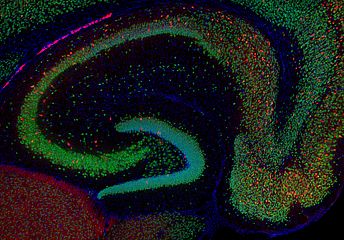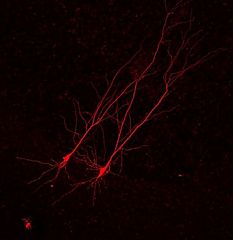Forschung
Cortical Brain Development

Studying cortical brain development is instrumental in unraveling the intricacies of complex brain processes and shedding light on the origins of various neurological and psychiatric diseases. By examining the evolving structure and function of the cortex, we aim to glean insights into the mechanisms underlying both normal cognitive functions and the disruptions that give rise to disorders. In essence, the study of cortical brain development serves as a vital bridge between fundamental neuroscience research and clinical applications. Insights gained from these studies provide a deeper understanding of normal brain function, illuminate the origins of complex brain disorders, and pave the way for innovative approaches to diagnosis, prevention, and treatment. As research techniques continue to evolve, our grasp of cortical development's role in health and disease will undoubtedly expand, offering new avenues for improving brain health and overall well-being.
Channeling our research efforts towards understanding hippocampal brain development has proven to be a pivotal strategy in unraveling the intricate mechanisms that shape memory, learning, and spatial navigation. The hippocampus plays a central role in cognition and has emerged as a focal point in the study of brain development. As a brain region with lifelong plasticity insights into the hippocampal physiology are valuable for many other areas of the brain – their development, connectivity, function, and dysfunction.
Neural Networks and Epilepsy

The pursuit of understanding epilepsy's enigmatic mechanisms is akin to embarking on a journey through the labyrinthine pathways of the brain. This neurological disorder, characterized by recurrent seizures, challenges researchers to unravel intricate threads connecting neural misfires and circuit abnormalities. We delve into these mechanisms, trying to uncover insights that allow a better understanding of brain function and dysfunction.
Epileptic seizures, often arising from hyperactive neuronal networks, offer a unique lens through which to study network dynamics. By investigating how these networks shift between normal and abnormal states, we decipher the intricacies of synchronization and desynchronization—an understanding that reverberates through various brain processes. In combination with our other research interests Epilepsy often originates from developmental anomalies or injuries. By scrutinizing how these factors disturb normal brain growth and connectivity, we aim to reveal insights into neurodevelopmental disorders at large. Those mechanisms become a gateway to understanding how early-life disruptions impact neural circuitry and function.


